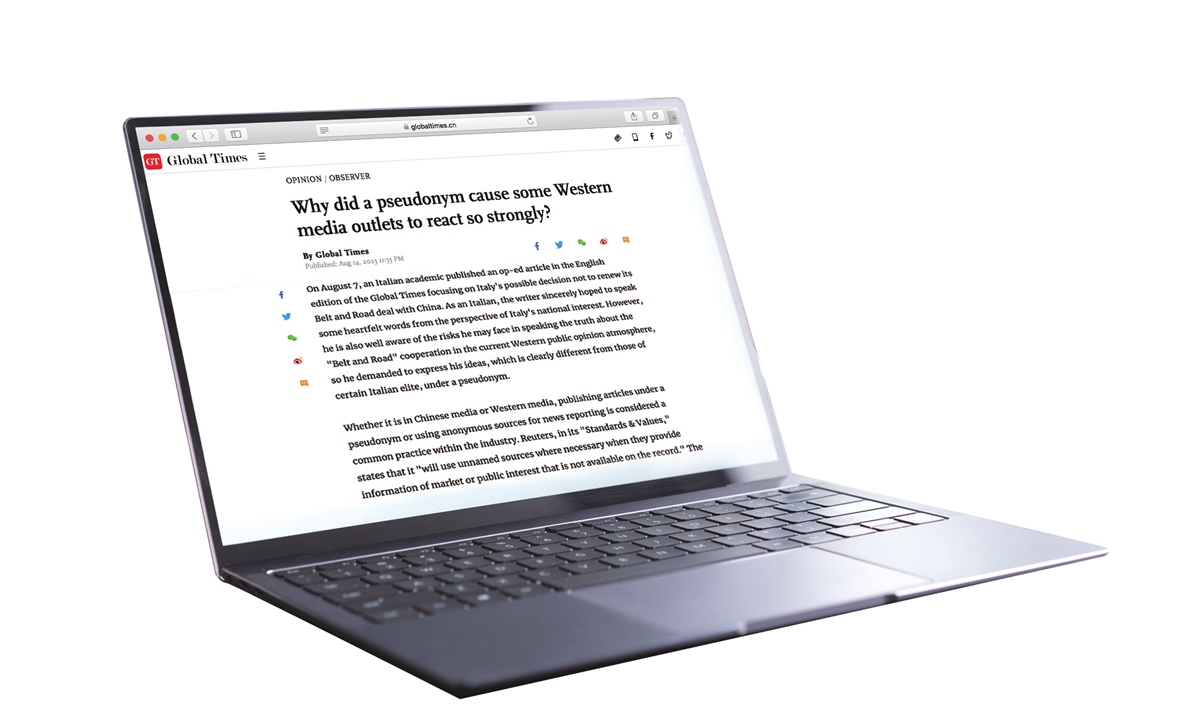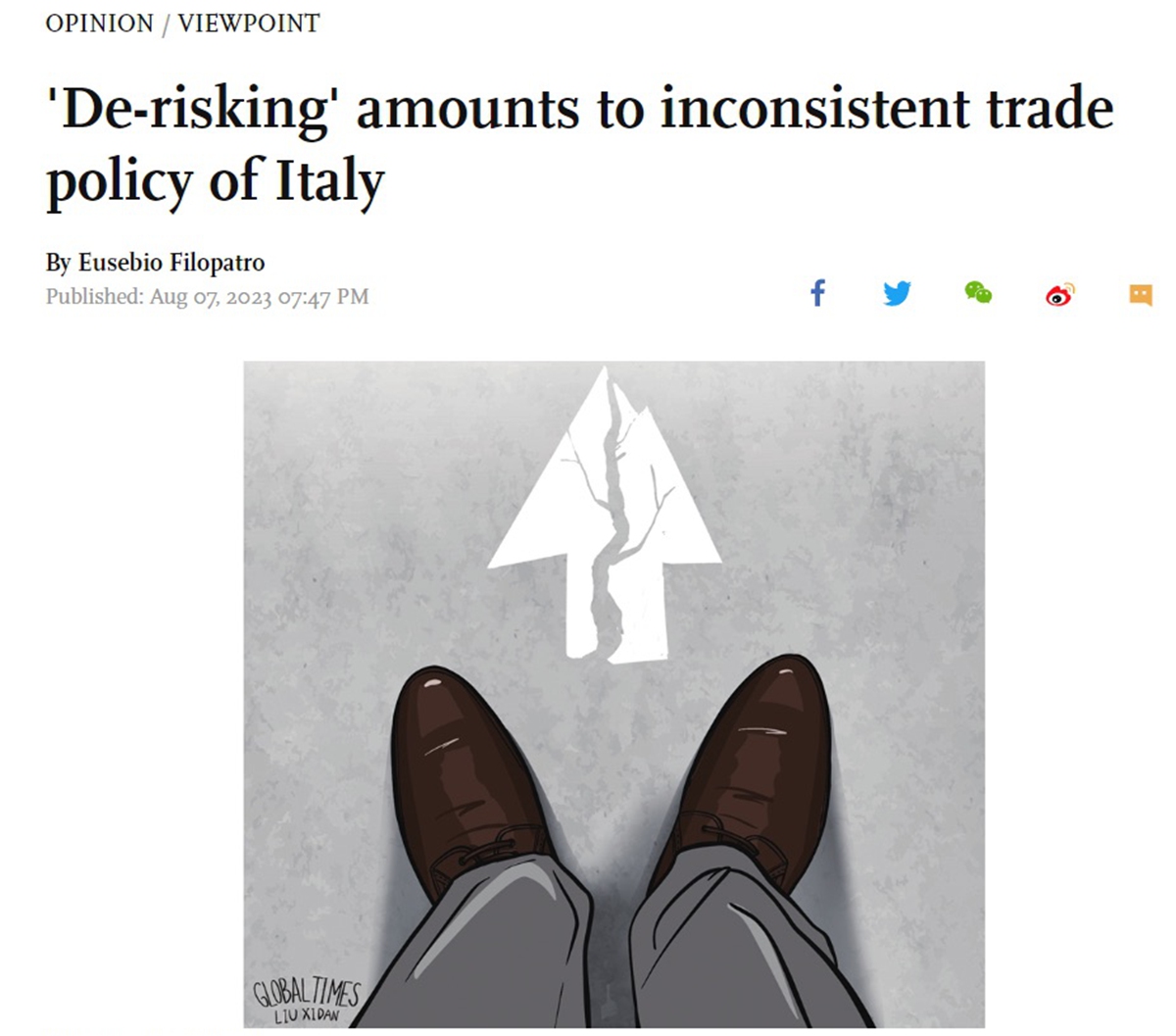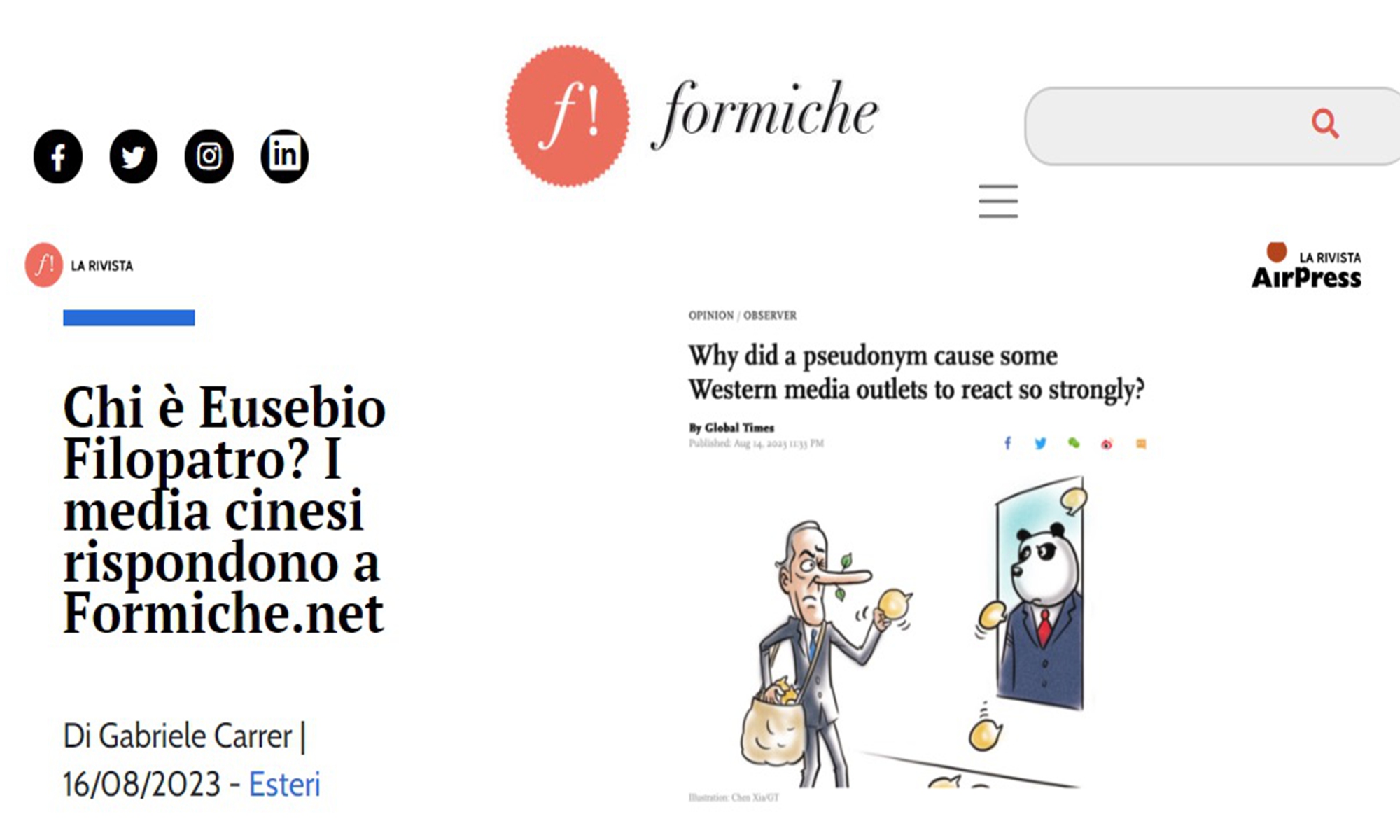
Photo: Liu Xidan/GT
Italian scholar Eusebio Filopatro (pseudonym) never expected his pseudonym would make him the center of a news incident. When the Global Times (GT) was maliciously attacked and slandered by certain Italian and Western media outlets for publishing his signed article under the pseudonym Eusebio Filopatro, while being accused of fabricating "a fictional character" to create "fake news," this Italian scholar was confused: Anonymity should not be an issue - you can use Google searching the key words "anonymous" or "anonymous source" and "New York Times" or "Reuters," and you will see that almost all Western media outlets rely on anonymous sources routinely. So why does the use of pseudonyms become a problem when it comes to Chinese media?
When GT sharply countered the smear campaign spearheaded by Western media outlets, this Italian scholar was greatly excited.
He stated that he would be honored to provide more analyses that meet the standards of GT and have them published in the future. However, he also noted that he would continue to contribute such content under his Eusebio Filopatro pseudonym especially when discussing more controversial matters.

The opinion piece by Eusebio Filopatro (pseudonym) first published by the Global Times, on August 7, 2023. Photo: Screenshot of GT website
A request for anonymityIn early August, the Italian scholar submitted an article to GT regarding Italy's intention to withdraw from the China-proposed Belt and Road Initiative (BRI). In the article, he expressed different views from those expressed by Italy's ruling elites. He pointed out that China's size, its trading figures, and its other partners will not be determined by Western policies and actions, and that the West's "de-risking" campaign will only make the West strangle itself in "splendid isolation." He called on Italian Prime Minister Giorgia Meloni to visit China to experience a power that does not project ideological and domestic policy preferences on partners, believing Italy's China policy should not be predetermined before hearing from the Chinese side.
Considering domestic public opinion sentiments in Italy, the scholar insisted on having the article published anonymously. He was well aware that speaking the truth about Italy's potential withdrawal from the BRI in the current domestic Italian public opinion atmosphere was risky.
Out of respect for the author and in the interest of his safety, GT agreed to publish this article under his pseudonym, Eusebio Filopatro.
However, the article was maliciously attacked by a number of Italian and Western media outlets after its publication. Italian media outlet Le Formiche claimed that it couldn't find any personal information about the author online, dismissing him as a "fictional character" created to "spread fake news." The Chinese version of RFI also published an article entitled "Italian media outlet questions Chinese state media use of fake people and fake news to criticize Rome's withdrawal from the BRI," amplifying the malicious attacks and rumors from the Italian media outlets against GT.
The slanderous reactions from Le Formiche and a few other Western media outlets have proven the validity of the concerns raised by the Italian scholar and the current deterioration of Western public opinion. Italian and Western media outlets have demonstrated a dogged determination to uncover the identity of the dissenting author.
In response to their malicious efforts, GT published an article on August 14 entitled "Why did a pseudonym cause some Western media outlets to react so strongly?," pointing out that the author requested the use of a pseudonym precisely because of his deep understanding of the nature of Italian and Western media outlets, with the resultant backlash having validated the author's concerns.
"In light of the intimidations and smearing recently suffered by Professor Alessandro Orsini and former ambassador Elena Basile for having expressed views that understood and defended Italy's national interests differently from Italy's ruling elite, I prefer to remain anonymous, and I will try to establish my authenticity with the Italian press in due time," Filopatro told GT.
"This 'pseudonym incident' involving the Italian author allows us to see more clearly that when it comes to attacking and smearing China, some Western media outlets have gone hysterical and fanatical, becoming accomplices in suppressing the truth and rational voices," reads GT's response article.
Nie Shujiang, an associate professor at the Guangming School of Journalism and Communication at the China University of Political Science and Law, endorsed the Global Times' approach. He expressed his belief that scholars using pseudonyms or publishing articles anonymously in the media is commonplace internationally and the Global Times simply and impeccably followed the internationally accepted practice.
"Everyone knows Mark Twain, but how many people know his real name was Samuel Clemens? George Kennan published an essay under the pseudonym X in the Foreign Affairs magazine. Elena Ferrante is currently the most popular and mysterious writer in Italy, whose true identity remains a mystery. Why do the Italian media outlets never question this?" Nie asked.
He emphasized that it is a hypocritical and unfair double standard that Western media outlets themselves use pseudonyms or anonymous sources but accuse Chinese media outlets of "creating fake news" when the latter do the same. Nie also lauded the response by the Global Times as "timely, positive, and proactive," as it set the record straight and positively contributed to international public opinion.
Li Haidong, a professor with the Institute of International Relations at the China Foreign Affairs University, told GT that Western media outlets often cite "anonymous sources" or "certain experts" in their reporting while discrediting Chinese media outlets for doing the same. This demonstrates some Western media's lack of basic respect for Chinese media. "They consistently employ a superior and arbitrary logic to judge the practices of Chinese media, which is unhealthy," Li said.

Italian media Le Formiche publishes a response to GT article to clarify its doubts and questions on a piece by Eusebio Filopatro (pseudonym). Photo: Screenshot of Le Formechinet
Rational voices being suppressed The response article from the Global Times quickly sparked fiery rejoinders in Italy. Alessandro Orsini, an Italian political analyst who has been a target of public opinion attacks due to his alleged pro-Russia views, with over 130,000 followers on Facebook, caught wind of GT's response article and commented on his Facebook account that what GT has reported about political intimidation in Italy is true, that GT is a serious and important outlet, and that he is pleased to have been mentioned as someone who cares for Italy's national interests.
The viewpoints expressed in GT's response article, which highlighted the suppression of truth and rationality in Italian public opinion, was also supported by Italian netizens. "Everybody talks about it, even foreign newspapers talk about it, [but] only by us the truth is hushed... And even if we wanted, we could not say it, because they keep us under close watch! Is this democracy or what?" one Italian netizen demanded.
Shen Yi, a professor in international relations at Fudan University, told the Global Times that the criticism of the Italian government's potential withdrawal from the BRI by an Italian scholar writing under a pseudonym reminded him of the famous story, "The Emperor's New Clothes."
"The Italian scholar was playing the role of a faceless mass on the road and hoping to shout out in an anonymous way that the emperor is actually naked," Shen said.
The so-called de-risking practice of Italy's withdrawal from the BRI is completely against its own interests. The benefits that Italy can gain from cooperating with China are obvious. By leaning toward the US, Italy might actually gain nothing, Shen said, noting that Italy is not only brainwashed but also delusional by not allowing others to speak the truth.
Li said that it's a pervasive phenomenon in some Western countries that the deteriorating domestic public opinion has led to scholars and other knowledgeable individuals to fear openly calling for rational relations with China. Western public opinion currently exhibits a "witch hunt mentality," and there is a very strong "political correctness" present in some Western media that is always against China. This puts individuals who want to express objective and rational opinions in an extremely disadvantageous position, making it difficult or even impossible for them to openly express their views. By contrast, information that demonizes China spreads everywhere.
'White flag' raised by Italian mediaSix days after Le Formiche accused the Global Times of fabricating the character "Eusebio Filopatro," the Italian media outlet Faro di Roma published a commentary article by Eusebio Filopatro, discussing the Wagner incident in Russia. The Eusebio Filopatro writing for Faro di Roma is the very Eusebio Filopatro who contributed to the GT in the first place. On August 17, L'Antidiplomatico published Filopatro's explanation about his anonymous article on GT and the subsequent smears GT suffered at the hands of Italian and Western media outlets. In the article, he stated that when faced with an article that differs from the mainstream position, attention shouldn't be focused too much on the author's identity but rather on the viewpoints expressed. Linking the author to "propaganda" is itself a form of intimidation and potential violence, violating the principles of freedom of speech and debate, Filopatro wrote.
In view of GT's response article and Filopatro's explanation, Le Formiche was compelled to publish a response. It had to acknowledge the existence of the anonymous author. However, it still attempted to discredit GT by referring to it as a "Party newspaper" and claimed that GT had failed to explicitly state that the author of the article was using a pseudonym.
Filopatro told GT that many columnists and Italian journalists he is in contact with publish under pseudonyms themselves, with the fact sometimes made explicit, and sometimes not.
"The claim by Formiche that there is a rule about revealing and explaining pseudonyms in Western press, and that GT should 'learn' from it, is completely false and made up, only to discredit GT and, in particular, my BRI article on GT," he said.
He also added that "Formiche basically raised a white flag, as they admitted that Eusebio Filopatro exists and is a foreign policy analyst for Italy and the EU."
After reviewing the whole incident, Filopatro said, "For me, this has been a very positive experience. Many more Italian readers have reflected on the termination of the [BRI-relating] Memorandum of Understanding. The right of GT to use pseudonyms and anonymity, just like every other newspaper, has been vindicated."
However, when asked if he would be willing to appear in Chinese or Italian media in the future under his real identity, he still expressed reservations, stating his preference to continue using his pseudonym: "I do not fancy being called 'a slimy piece of excrement,' nor do I wish to have my face displayed on Italy's main newspaper as a sort of 'public enemy' or 'voice of the propaganda.' Neither do I wish to have my actions questioned in parliament as a sort of national problem. Hence, I consider Italy's public debate unfree, and I prefer to maintain a pseudonym."
Chinese experts who are following this matter said that the incident has damaged the credibility of the Italian media, exposing a bias and double standard toward Chinese media. It also reveals the hidden political persecution mechanisms in the Western society, causing people to be afraid of speaking the truth and face repercussions for speaking the truth, which is a social tragedy, analysts warned.






